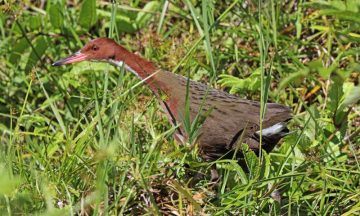From Phys.Org:
 New research has shown that the last surviving flightless species of bird, a type of rail, in the Indian Ocean had previously gone extinct but rose from the dead thanks to a rare process called ‘iterative evolution’. The research, from the University of Portsmouth and Natural History Museum, found that on two occasions, separated by tens of thousands of years, a rail species was able to successfully colonise an isolated atoll called Aldabra and subsequently became flightless on both occasions. The last surviving colony of flightless rails is still found on the island today.
New research has shown that the last surviving flightless species of bird, a type of rail, in the Indian Ocean had previously gone extinct but rose from the dead thanks to a rare process called ‘iterative evolution’. The research, from the University of Portsmouth and Natural History Museum, found that on two occasions, separated by tens of thousands of years, a rail species was able to successfully colonise an isolated atoll called Aldabra and subsequently became flightless on both occasions. The last surviving colony of flightless rails is still found on the island today.
This is the first time that iterative evolution (the repeated evolution of similar or parallel structures from the same ancestor but at different times) has been seen in rails and one of the most significant in bird records.
The white-throated rail is a chicken-sized bird, indigenous to Madagascar in the south-western Indian Ocean. They are persistent colonisers of isolated islands, who would have frequent population explosions and migrate in great numbers from Madagascar. Many of those that went north or south drowned in the expanse of ocean and those that went west landed in Africa, where predators ate them. Of those that went east, some landed on the many ocean islands such as Mauritius, Reunion and Aldabra, the last-named is a ring-shaped coral atoll that formed around 400,000 years ago.
With the absence of predators on the atoll, and just like the Dodo of Mauritius, the rails evolved so that they lost the ability to fly. However, Aldabra disappeared when it was completely covered by the sea during a major inundation event around 136,000 years ago, wiping out all fauna and flora including the flightless rail.
More here.
